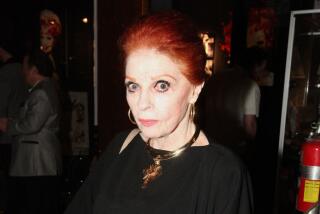Gale Gordon, ‘Lucy’ Veteran, Dies at 89
- Share via
Gale Gordon, the veteran slow-burn comedic actor of radio and television best remembered for his roles in several of Lucille Ball’s long-running series, including the bombastic banker Theodore J. Mooney of “The Lucy Show,” has died. He was 89.
Gordon, who had lived for many years on his Tub Canyon Ranch in Borrego Springs, died Friday of cancer in the Redwood Terrace Health Center in Escondido, his close friend Mike Bell said Saturday.
Gordon’s actress wife, Virginia, had died a few weeks earlier in the same nursing home.
The son of British actress Gloria Gordon, the actor born Charles T. Aldrich had a long association with Ball in her many television series.
Gordon began working with her on “My Favorite Husband” in radio and on the television version in 1953-54. The show was the precursor to the classic “I Love Lucy,” in which Gordon played the Tropicana boss of bandleader husband Ricky (then Miss Ball’s real-life husband, Desi Arnaz).
After the Arnaz couple’s divorce, Gordon stuck with Ball, first as her banker Mooney in “The Lucy Show” from 1962-68, and then as her blustery brother-in-law boss Harrison Carter in the subsequent “Here’s Lucy,” which ran from 1968-74. Gordon played Curtis McGibbon in Ball’s final attempt at series television, “Life with Lucy,” which aired for only two months in 1986.
His familiar dead calm followed by exploding outrage also marked the persona of his characters in two other early television series--as Mr. Wilson, next-door neighbor of “Dennis the Menace” in 1959-63 and as Osgood Conklin in the series that moved him from radio to television, “Our Miss Brooks,” with Eve Arden in 1952-56.
Times entertainment columnist Hal Humphrey, describing Gordon’s trademark behavior in 1962, wrote: “Gale lets his slow burn smolder for several seconds, during which time he will speak in the calmest of tones. When the explosion finally comes, it is as sudden and loud as a cannon shot, and leaves his audience as weak and hysterical from the suspense as from the climax.”
Commenting on his often-emulated technique, Gordon told The Times: “To get the best audience reaction, the secret for losing one’s temper is not to react violently too quickly. The longer you wait, the more chance you give the audience to think of all the things they would do under such circumstances.”
Although he launched his career on radio, it was not as a comedian. He began playing the ukulele for free on Los Angeles’ KFWB. He quickly advanced to earning $2.50 a show at Los Angeles’ KHJ.
The actor’s fortunes and exposure improved in 1930 when Mary Pickford hired him for $100 a show in her dramatic series. He won other serious roles in “Gangbusters,” “This is Your FBI” and as the voice of the interplanetary adventurer “Flash Gordon.”
By the time he was drafted into the Army in World War II, Gordon had done more than 5,000 radio performances and was appearing on 35 shows.
Gordon’s comedic blowhard character originated as Mayor LaTrivia on “Fibber McGee and Molly,” where he remained for 13 years. It was a hard-won role.
Despite his famous blustery persona, Gordon described himself as “the most easygoing man in the world.”
“I have no temper,” he said in 1962, “and it’s always amusing when someone comes to the house to work for us. Usually a week later they’ll admit they were terrified to take the job because they expected me to blow up like I do on the screen.”
A few weeks earlier, Gordon had encountered a woman fan outside the studio who pleaded with him to “say something nasty.”
“Madam!” he obligingly responded with full-blown haughtiness, “I am never nasty unless I get paid for it!”
Gordon also appeared in a handful of films.
Gordon is survived by a sister, Judy Wormser, and several nieces and nephews.
More to Read
The complete guide to home viewing
Get Screen Gab for everything about the TV shows and streaming movies everyone’s talking about.
You may occasionally receive promotional content from the Los Angeles Times.






